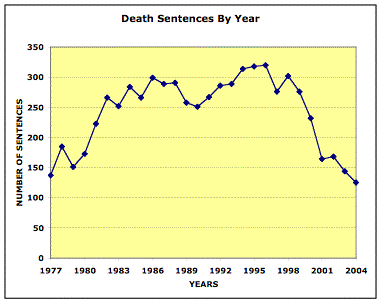Entries by Death Penalty Information Center
News
May 03, 2005
Puerto Ricans Again Reject Federal Death Sentence
Two Puerto Rican defendants were given life sentences by the same jury that had convicted them of murder in the course of an armored truck robbery that occurred in 2002. Puerto Rico has not used the death penalty for almost 80 years and forbids the practice in its constitution. However, the U.S. federal death penalty applies to the Commonwealth. Gov. Anibal Acevedo Vila said that the jury acted in accordance with Puerto Rican tradition, which“loathes and is against the…
Read MoreNews
Apr 29, 2005
PUBLIC OPINION: New Jersey Citizens Favor Life Without Parole Over Death Penalty
In a dramatic shift from 1999, citizens in New Jersey now favor life without parole over the death penatly for those who commit murder. In a Rutgers University poll released on April 28, 47% of N.J. respondents preferred life without parole rather than the death penalty. In a similar poll six years ago, 44% of respondents chose the death penalty, while 37% supported life…
Read MoreNews
Apr 29, 2005
DNA Evidence May Lead to Exoneration in Former Capital Case
Results from DNA testing may soon lead to the exoneration of Larry Peterson in New Jersey. He would become the first person in the state to be cleared of a homicide through DNA evidence. Peterson was convicted of a rape and murder that occurred in 1987. For the past 10 years, Peterson tried to have DNA evidence from his case tested. At his original trial in which he faced the possibility of a death sentence, the prosecution maintained that hairs from the crime scene…
Read MoreNews
Apr 29, 2005
Soldier Sentenced to Death for Iraq War Murder
A 15-member military jury sentenced Sgt. Hasan Akbar to death for killing 2 U.S. military officers in Kuwait in 2003 during the opening days of the Iraq invasion. At his sentencing, Akbar said,“I want to apologize for the attack that occurred. I felt that my life was in jeopardy, and I had no other options. I also want to ask you for forgiveness.” He is the first American since the Vietnam era to be prosecuted for murdering a fellow soldier in wartime. (N.Y. Times,…
Read MoreNews
Apr 26, 2005
Death Sentences Decline in 2004
News
Apr 26, 2005
Supreme Court to Consider “Lingering Doubt” Evidence in Capital Cases
Oregon v. Guzek — The U.S. Supreme Court has announced that it will consider whether capital defendants have a constitutional right to present evidence that would cast doubt on their conviction during the penalty phase of their death penalty trials, a question that has divided state and lower federal courts for many years. The defendant, Randy Lee Guzek, sought to introduce alibi evidence after he was convicted during the sentencing phase of his trial. This…
Read MoreNews
Apr 22, 2005
Los Angeles Times Calls for Moratorium on California Death Penalty
A recent Los Angeles Times editorial called on California lawmakers to impose a moratorium on executions until a state commission charged with examining the fairness and accuracy of California’s death penalty laws can finish its work. The paper noted that a similar review led by New York state lawmakers resulted in findings that effectively ended capital punishment in that state for this year. The editorial stated:Many Californians, lawmakers as well…
Read MoreNews
Apr 20, 2005
NEW RESOURCE: “A Life and Death Decision” Examines Jury Deliberations
“Scott Sundby’s new book,“A Life and Death Decision: A Jury Weighs the Death Penalty” is an impartial look at capital jury deliberations through the examination of data collected by the Capital Jury Project and other studies of group decision-making. Drawing on the Capital Jury Project’s interviews with more than 1,000 jurors from across the country who had taken part in death penalty cases, the book addresses crucial issues such as jury instructions, jury room…
Read MoreNews
Apr 20, 2005
NEW RESOURCE: “Executed on a Technicality”
Executed on a Technicality: Lethal Injustice on America’s Death Row, by Professor David Dow, is a behind-the-scenes look at the death penalty through the lens of an attorney who formerly supported capital punishment. Dow, who teaches at the University of Houston Law Center and founded the Texas Innocence Network, provides case histories illustrating serious flaws in the death penalty system. He uses these cases to guide readers through a web of coerced…
Read MoreNews
Apr 20, 2005
Death Penalty Prosecutions May be Halted if Funding is Inadequate
The Louisiana Supreme Court recently ruled that trial judges can halt prosecutions of poor defendants until the state comes up with the money to pay for an adequate defense. Louisiana has in the past failed to adequately fund indigent defense programs.“I think it’s a warning,” said Phyllis Mann, appointed counsel for Benjamin Tonguis and Adrian Citizen, two death penalty defendants whose cases were reviewed by the state supreme court.“The court is saying as plainly as…
Read More